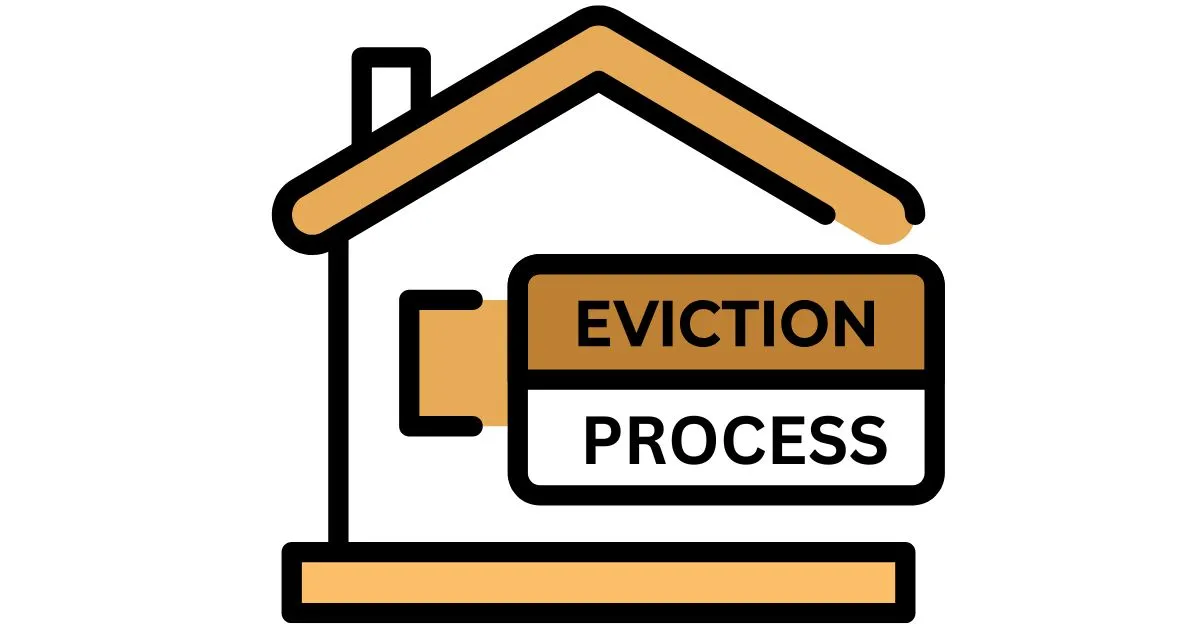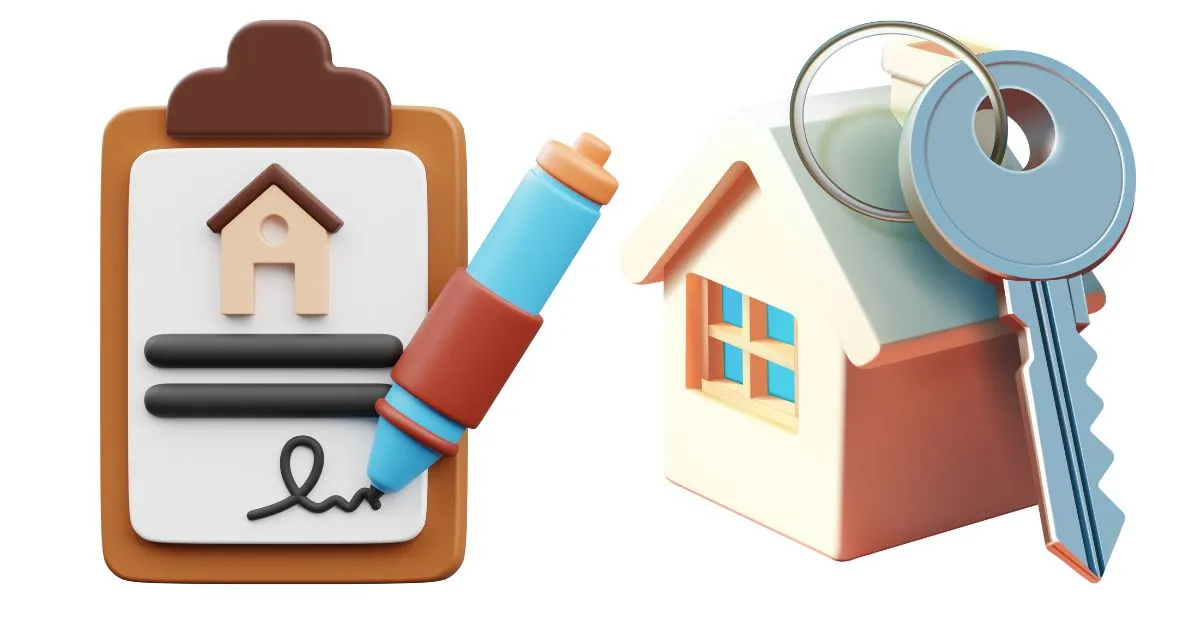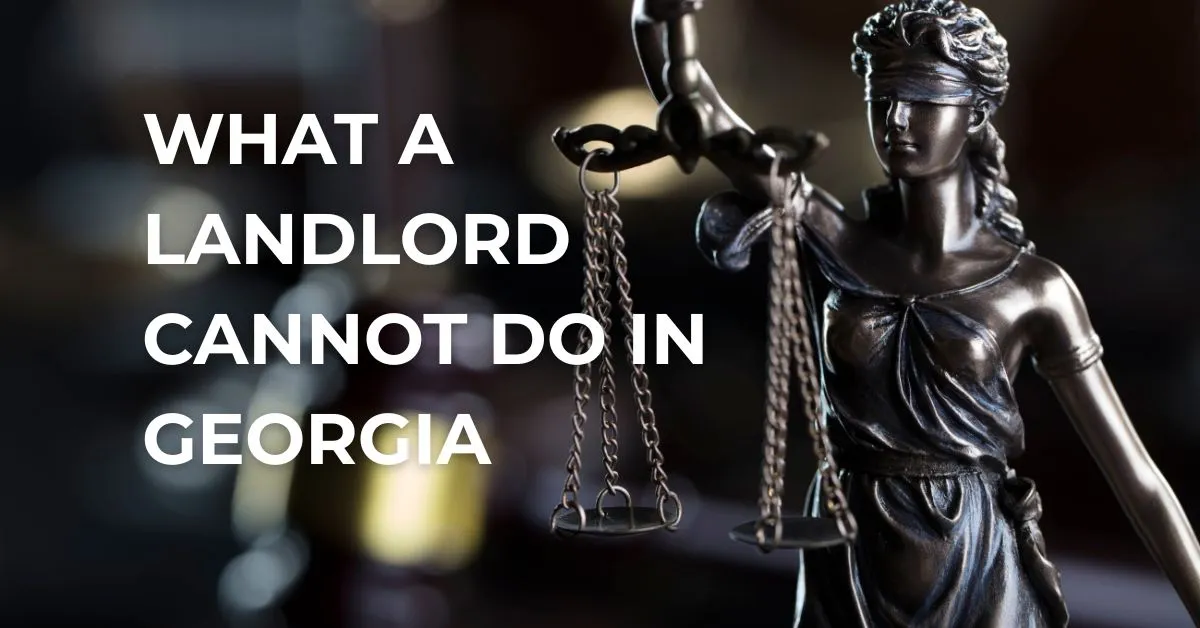Being a landlord in Georgia comes with its own set of challenges. Understanding the legal landscape is crucial to avoid pitfalls and ensure a profitable investment.
Georgia rental laws provide a framework for landlord-tenant relationships. They outline what a landlord can and cannot do, ensuring a fair and balanced approach to property management.
However, navigating these laws can be complex. Missteps can lead to legal issues, tenant dissatisfaction, and even financial losses. This is where understanding landlord rights in Georgia becomes essential.
This article aims to shed light on these rights and restrictions. It will delve into what a landlord cannot do under Georgia law, providing a comprehensive guide for property owners and investors.
We will also explore the Georgia eviction process. This is a critical aspect of property management, and understanding it can help avoid costly mistakes and legal complications.
Moreover, we will discuss the role of professional property management. This service can help transform property ownership into a stress-free and profitable experience.
By the end of this guide, you will have a clearer understanding of your rights and limitations as a landlord in Georgia. This knowledge can help you navigate the rental market more effectively and confidently.
Understanding Landlord Rights and Limitations in Georgia
To navigate Georgia’s rental market, landlords must understand their rights and limitations. This knowledge ensures compliance with state laws while optimizing property investment returns.
First, it's vital to recognize that Georgia's landlord-tenant laws govern these relationships. Familiarity with these regulations helps landlords operate within legal boundaries and avoid disputes.
Landlord rights typically include the ability to set rent, require security deposits, and enforce lease agreements. However, these rights come with responsibilities and constraints to protect tenants.
Key limitations prevent landlords from acting arbitrarily, ensuring tenant rights are upheld. Understanding these restrictions can prevent legal issues and tenant dissatisfaction.
Some actions landlords in Georgia cannot take involve areas like property access, eviction, and tenant treatment. Being well-versed in these constraints safeguards both landlords and their investments.
Here's a quick list of areas where landlords may face limitations:
- Entering the property without proper notice.
- Discriminating against prospective or current tenants.
- Failing to maintain habitable living conditions.
- Illegally evicting tenants or performing retaliatory actions.
- Mishandling security deposits.
The Legal Framework of Georgia Rental Laws
Georgia rental laws set the stage for landlord and tenant interactions. These laws dictate the rights and responsibilities of each party.
The framework covers various aspects, including leases, security deposits, and eviction procedures. It's crucial for landlords to understand these components.
Lease agreements are the foundation of this framework, outlining the terms of tenancy. A well-crafted lease can protect both landlords and tenants by detailing expectations and obligations.
Security deposits are also regulated, with laws covering collection, storage, and return. Adhering to these regulations helps prevent disputes.
Finally, landlords must follow proper eviction procedures. This involves giving notice and adhering to court processes, ensuring evictions are lawful and fair.
Key Restrictions on Landlord Actions
Georgia laws impose several restrictions on landlords to protect tenants. Understanding these limits is essential to avoid pitfalls in property management.
One significant restriction involves tenant privacy and property access. Landlords must provide proper notice before entering a tenant's home. This respects tenant rights and fosters positive relationships.
Discrimination in tenant selection or treatment is prohibited under the Georgia Fair Housing Act. Landlords must treat all applicants and tenants equally, respecting protected characteristics such as race, religion, and gender.
Maintaining habitable living conditions is another critical obligation. Landlords must ensure properties comply with health and safety regulations, addressing issues like repairs promptly. This includes things like heating and air conditioning, which are specifically required now in Georgia law.
The law also restricts security deposit amounts. Landlords must manage these funds carefully and return them according to state guidelines. In Georgia, the maximum security deposit amount is now 2x the monthly rent.
- Prohibited discriminatory practices.
- Entry without notice.
- Neglecting property repairs.
- Mishandling of tenant deposits.
- Engaging in retaliatory actions.
By respecting these limitations, landlords can ensure legal compliance and enhance tenant satisfaction. Such practices not only prevent legal entanglements but also contribute to a stress-free and profitable property investment experience.
Navigating the Georgia Eviction Process
Evicting a tenant in Georgia requires understanding strict legal procedures to prevent complications. Compliance with these procedures ensures landlord rights are protected while respecting tenant rights.

The eviction process begins when a tenant breaches the lease agreement, such as failing to pay rent or violating other terms. Understanding when and how to initiate eviction is crucial to avoid disputes.
Before filing for eviction, landlords must give tenants proper notice. This step provides tenants with the opportunity to address issues or prepare for alternative housing. While Georgia law only requires a 3-day notice, federal law under the CARES Act now requires 30 days’ notice if you have a federally insured mortgage on the property (the vast majority of mortgages).
Navigating the legal process involves filing specific documents, like a dispossessory affidavit, with the court. Following correct procedures protects landlords and ensures the eviction is processed without unnecessary delays.
Key elements of the Georgia eviction process include:
- Sending the appropriate notice to the tenant.
- Filing the dispossessory affidavit with the county magistrate court.
- Awaiting a response from the tenant within the legal timeframe, typically 7 days after being served.
- Attending a court hearing, if necessary.
- Coordinating with local authorities for tenant removal if a court order is issued.
Each step must be followed precisely to secure a lawful eviction. Mistakes can lead to legal challenges or delays, undermining landlord efforts to reclaim their property.
Steps Required for a Lawful Eviction
Beginning the eviction process requires delivering the right notice to tenants. Types of notices may vary based on lease violations, such as a "pay or quit" notice for unpaid rent.
After a notice is served, landlords must file a dispossessory affidavit with the appropriate court. This legal document outlines tenant violations and is a crucial step in legitimizing the eviction process. This can only be done after the required notice period.
Tenants have a limited period to respond to the court notice, usually seven days. Their response can affect the outcome of the eviction, potentially leading to a court hearing where both parties present their case.
If the court sides with the landlord, an official order for eviction is issued, called a writ of possession. The order allows authorities to remove tenants who refuse to vacate, ensuring landlords regain property access lawfully.
Common Pitfalls in the Eviction Process
Filing incomplete or incorrect documentation is a common mistake, delaying evictions. Attention to detail when submitting forms is essential to prevent processing issues.
Another pitfall is failing to provide adequate notice to tenants. Any oversight can invalidate eviction proceedings, resulting in a need to restart the process.
Finally, attempting "self-help" evictions, such as changing locks or removing tenant belongings, is illegal in Georgia. Such actions can lead to significant legal penalties for landlords and should be avoided at all costs.
Tenant Privacy and Property Access
Tenant privacy is a fundamental right protected by Georgia rental laws. Landlords must respect tenants' privacy, balancing property management needs with legal obligations.

Understanding when a landlord can enter a tenant's property is essential. Unauthorized entry constitutes a violation of privacy rights and can result in legal issues.
Landlords must provide proper notice before entering a rental unit, except for emergencies. This requirement assures tenants have adequate time to prepare for property access.
Clear understanding of these rights and obligations helps prevent disputes between tenants and landlords. Awareness fosters a respectful and compliant rental relationship.
Key aspects landlords should remember include:
- Providing advance notice before entering rental units.
- Entering only for legitimate purposes, such as repairs or inspections.
- Respecting the tenant’s right to quiet enjoyment of their home.
Notice Requirements for Landlord Entry
Georgia law mandates that landlords must provide sufficient notice for non-emergency access to rental units. Typically, 24-hour notice is considered reasonable, though specific lease terms may vary.
The notice should clearly outline the reason for entry and the anticipated duration. Transparent communication helps build trust and reduces potential conflicts.
In emergencies, landlords may enter without prior notice. However, these situations should be genuine threats to the property or tenant safety, justifying immediate access.
Respecting Tenant Rights to Privacy
Honoring tenant privacy rights builds strong landlord-tenant relationships. Ensuring open communication and respecting legal boundaries maintain peace and avoid conflicts in rental properties.
Security Deposits and Tenant Property
Handling security deposits and tenant property requires keen attention to Georgia rental laws. Landlords must adhere to specific rules to ensure compliance and avoid disputes.
Security deposits are often a contentious issue in landlord-tenant relationships. Proper handling of these funds is crucial for maintaining trust and legality.
Georgia law limits the amount landlords can charge as a security deposit and dictates how these funds must be managed.
Failing to comply with these regulations can lead to financial penalties and damage relationships with tenants. Thus, understanding these obligations is vital for landlords.
When managing tenant property, especially post-tenancy, landlords must follow legal procedures. This ensures tenants' rights are respected and legal liabilities are minimized.
Key considerations for landlords include:
- Adhering to limits on security deposit amounts.
- Providing written records of deposit transactions.
- Following the legal process for abandoned property.
Handling and Returning Security Deposits
Georgia landlords must manage security deposits with clarity and precision. The law requires landlords to deposit these funds in a separate account.
Upon a tenant's departure, landlords have a set timeframe to return the deposit. Typically, this is within 30 days after tenancy ends.
Landlords must provide an itemized statement detailing any deductions. Transparency helps prevent disputes and fosters goodwill with tenants.
Dealing with Abandoned Tenant Property
When tenants leave items behind, landlords face the task of handling abandoned property. Georgia law requires landlords to provide notice before disposing of these belongings.
The law aims to protect tenants' ownership rights while allowing landlords to maintain property value. Following these guidelines ensures compliance and mitigates potential conflicts.
Discrimination and Fair Housing Compliance
Understanding and complying with fair housing laws is fundamental for landlords. These laws are designed to prevent discrimination in housing-related activities.
In Georgia, both federal and state laws offer protections to ensure equal housing opportunities for all individuals. Such compliance is crucial for avoiding legal issues and fostering a fair rental environment.
Failure to adhere to these laws can result in severe penalties. Landlords must be fully aware of the protected characteristics and ensure their practices do not inadvertently violate these rights.
A few critical protected characteristics include race, color, national origin, gender, disability, and familial status. Ensuring compliance requires diligence and a proactive approach.
Here's a quick look at key compliance actions:
- Conduct unbiased tenant screenings.
- Standardize application processes.
- Train staff on fair housing laws.
- Implement non-discriminatory advertising.
- Avoid making tenancy decisions based on protected characteristics.
Understanding Protected Characteristics
Protected characteristics are a cornerstone of fair housing laws. Landlords must understand these to prevent discrimination.
Race, color, national origin, religion, gender, disability, and familial status are primary characteristics covered by both federal and state laws. These characteristics aim to foster equal opportunities in the housing market. Please note that some case law indicates that “gender” includes sexual preference and gender identity, so while they aren’t specifically listed in the statute, you would be wise to consider these protected also.
Knowledge of these areas helps landlords create inclusive rental experiences. By being informed, landlords can align their policies with legal standards.
Ensuring Equal Treatment of Tenants
Fair treatment is not just a legal obligation but also a best practice for successful property management. Equal treatment safeguards against discrimination claims.
Landlords should employ consistent application processes and criteria. This method ensures that every prospective tenant is evaluated equally.
Additionally, conducting regular training helps staff understand and implement fair housing practices. This proactive stance minimizes legal risks and promotes an inclusive community.
The Role of Professional Property Management
Professional property management offers indispensable support to landlords. It ensures compliance with intricate laws and boosts investment returns.
A property manager handles the nitty-gritty of day-to-day operations. They ensure everything from maintenance to legal obligations runs smoothly.
By leveraging expert knowledge, property managers streamline processes. This approach not only minimizes landlord stress but also enhances tenant satisfaction.
Here are some ways property managers can add value:
- Regularly monitor local law changes.
- Provide effective communication with tenants.
- Oversee maintenance and repairs.
- Manage financial reporting and budgeting.
- Conduct thorough tenant screenings.
Professional property management is a strategic investment. It maximizes property potential while minimizing risks and hassles.

Benefits of Hiring a Property Manager
Hiring a property manager provides several key benefits. Firstly, they bring a wealth of market knowledge and experience. This expertise helps in setting competitive rent prices and increasing occupancy rates.
Property managers also excel in tenant relations. They facilitate clear communication, ensuring that tenant issues are promptly addressed. This leads to higher tenant satisfaction and retention.
Additionally, property managers handle time-consuming tasks such as rent collection and legal compliance. This efficiency allows landlords to focus on strategic aspects of their property investment.
How Property Management Can Enhance Compliance and Profitability
Property management enhances compliance with legal standards. Managers stay informed on changing laws and ensure all operations meet requirements. This vigilance prevents costly legal mistakes and ensures smooth property operations.
Moreover, a well-managed property leads to improved profitability. With optimized rental strategies and efficient cost management, landlords see better financial returns. Engaging a property manager is a smart step towards a profitable and compliant investment.
Conclusion: Maximizing Your Investment While Respecting Tenant Rights
Understanding what a landlord cannot do in Georgia is crucial. It ensures you respect tenant rights while maximizing your property investment.
By adhering to Georgia rental laws, you safeguard your investment from legal issues. Compliance not only protects you but also fosters a positive tenant relationship.
A proactive approach to understanding these regulations is essential. Employing professional property management can guide you in staying compliant and efficient. With the right support, you can enhance profitability while maintaining tenant satisfaction and retention.
Invest wisely; respect tenant rights for long-term success in the competitive rental market.


